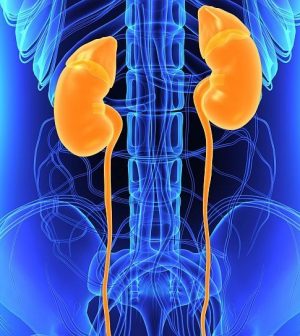- The Best Time of Day to Drink Bone Broth to Maximize Health Benefits
- 8 Ways to Increase Dopamine Naturally
- 7 Best Breads for Maintaining Stable Blood Sugar
- Gelatin vs. Collagen: Which is Best for Skin, Nails, and Joints?
- The Long-Term Effects of Daily Turmeric Supplements on Liver Health
- Could Your Grocery Store Meat Be Causing Recurring UTIs?
- Are You Making This Expensive Thermostat Error This Winter?
- Recognizing the Signs of Hypothyroidism
- 10 Strategies to Overcome Insomnia
- Could Artificial Sweeteners Be Aging the Brain Faster?
Failing Kidneys Could Bring Higher Dementia Risk

Chronic kidney disease may carry an increased risk of dementia, according to a Swedish study.
In people with chronic kidney disease, the bean-shaped organs gradually lose their ability to filter waste from the blood and eliminate fluids.
“Even a mild reduction in kidney function has been linked to an increased risk of cardiovascular disease and infections, and there is growing evidence of a relationship between the kidneys and the brain,” said study author Dr. Hong Xu, a postdoctoral researcher at the Karolinska Institute in Stockholm.
For the study, her team analyzed health data from nearly 330,000 older people in Stockholm. None had dementia or had undergone kidney transplants or dialysis when the study began.
During an average five-year follow-up, 6% were diagnosed with dementia. As kidney function decreased, the rate of dementia increased, the researchers found.
Rates of dementia were more than four times higher among those with a kidney filtration rate below 30 mL per minute, compared to those with a normal filtration rate of 90 to 104 mL per minute, according to the study authors.
After adjusting for other dementia risk factors (such as smoking, alcohol use, high blood pressure and diabetes), the researchers concluded that compared to people with normal kidney function, people with filtration rates of 30 to 59 mL per minute had a 71% higher dementia risk. People with filtration rates below 30 mL had a 162% higher risk.
The investigators also analyzed blood test data on nearly 206,000 study participants who had multiple blood tests over one year to estimate how fast kidney function declined.
A faster decline in kidney filtration rates was also associated with a higher risk of a dementia diagnosis, according to findings published online May 5 in the journal Neurology.
The researchers said 10% of the dementia cases in the study could be attributed to a kidney filtration rate of 60 mL per minute or less. That’s a higher percentage of dementia cases than attributed to other risk factors like heart disease and diabetes.
Xu noted that the risk of dementia, as with chronic kidney disease, increases with age.
“With no effective treatments to slow or prevent dementia, it is important to identify possible modifiable risk factors,” she said in a journal news release. “If we could prevent or delay some cases of dementia by preventing or treating kidney disease, that could have important public health benefits.”
While the study links kidney function to the development of dementia, it does not prove cause and effect, Xu added.
About 15% of U.S. adults have chronic kidney disease.
More information
The National Kidney Foundation has more on chronic kidney disease.
SOURCE: Neurology, news release, May 5, 2021
Source: HealthDay
Copyright © 2026 HealthDay. All rights reserved.










